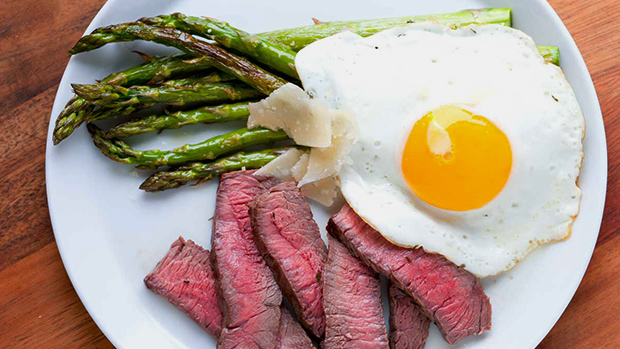Meal Timing & Fat Loss: What We Know So Far
Meal timing is a hotly debated issue, but if your goal right now is fat loss then multiple studies all point to the same thing: don't eat right before bed. Or, at the very least, have a lighter dinner.
Why? Late-night eating seems to impair fat metabolism. It's been shown to raise insulin levels and it generally leads to a negative metabolic profile. So the advice has been to avoid eating about 3 hours before bed, or just have a low-carb, higher protein food if you're truly hungry.
Now, eating less at night does have an upside: you get to eat a big breakfast... and you actually wake up wanting it. That's a good sign despite what the "anorexia lite" fasting fanatics would have you believe. Several studies show that a big breakfast helps regulate your appetite hormones throughout the day and that people who skip breakfast are more likely to gain fat in the long run.
A big high-protein breakfast is less likely to be converted and stored as body fat, partly due to the sensitivity of muscle vs. fat tissue, which changes over the course of the day. Now, a new study is shedding more light on this.
Researchers recruited 18 men and 11 women who were overweight and had type 2 diabetes. They were divided up and put on two different weight-loss diets of equal calories for three months.
- The first group ate three meals: a big ol' breakfast, a medium-sized lunch, and a smaller dinner.
- The second group ate six small meals evenly spaced throughout the day. Three of these "meals" were snacks.
The group that ate a big breakfast and a smaller dinner lost more weight, experienced less hunger and fewer carb cravings, and were better able to control their diabetes with less insulin compared to the group that had six feedings per day.
Remember, both groups were eating the same number of calories; those calories were just divvied up differently. One researcher, Daniela Jakubowicz, M.D., said:
"The hour of the day – when you eat and how frequently you eat – is more important than what you eat and how many calories you eat. Our body metabolism changes throughout the day. A slice of bread consumed at breakfast leads to a lower glucose response and is less fattening than an identical slice of bread consumed in the evening."
No, you're probably not an obese person with type 2 diabetes, but studies on regular folks have shown about the same thing. Namely, this old saying has a lot of merit if your goal is fat loss:
"Eat breakfast like a king, lunch like a prince, and dinner like a pauper."
Cutting off your eating a few hours before bed is old-school diet advice, but it does work. And, based on this study, it's not just because you're eating fewer total calories for the day. Eating the same number of calories but "front loading" them earlier in the day seems to match how our bodies work best, especially hormonally.
Caveats? Yes, a few. If you lift in the evening, don't skip your post-workout meal, just that snack before bed. Taking care of pre and intra-workout nutrition is more important than post-workout anyway.
Don't go to bed hungry either. You'll wreck your sleep. Just have a light protein snack or a protein shake containing micellar casein, like Metabolic Drive® Protein. Keep the carbs to a minimum at this time.
If you look like a broomstick wearing a medium T-shirt, eat when you want. This is about fat loss, not gains, bro.
- The Endocrine Society. High-energy breakfast promotes weight loss: Diet helps reduce total daily insulin dose for type 2 diabetes. ENDO 2018, the 100th annual meeting of the Endocrine Society in Chicago, Ill.





